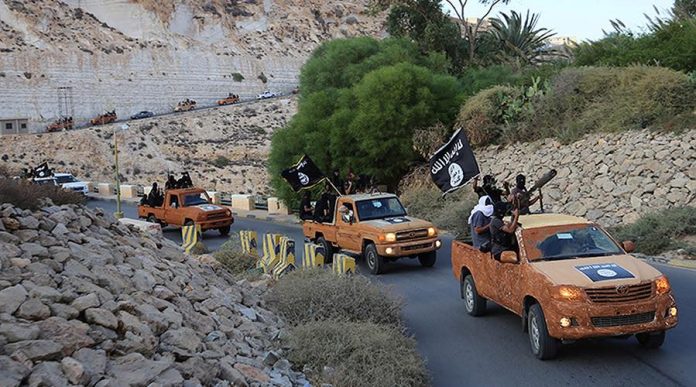US targets ISIS convoy that agreed to leave Lebanon under Hezbollah deal.
After a weeklong offensive by the Lebanese army, the Syrian government and Lebanese Hezbollah fighters, more than 300 ISIS fighters and about as many of their relatives withdrew from their enclave on the Syria-Lebanon border. The buses were escorted by the Syrian army across government-controlled territory on Tuesday, heading to eastern Syria, near the Iraqi border.
But anger over the transfer deal prompted the US-led coalition to launch airstrikes on Wednesday to block the convoy.
“To prevent the convoy from moving further east, we cratered the road and destroyed a small bridge,” US Army Col. Ryan Dillon, spokesman for the anti-ISIS coalition, told the Agence France-Presse. The US military later confirmed the operation to PRI.
Brett McGurk, the special presidential envoy for the coalition to defeat ISIS, hinted at action on Twitter on Tuesday.
“Our coalition will help ensure that these terrorists can never enter Iraq or escape from what remains of their dwindling ‘caliphate,’” McGurk added.
Col. John Thomas, a spokesman for US Central Command, said the convoy itself was not bombed due to the presence of civilians among the fighters.
“We believe we have the legal authority to stop the progress of the convoy. The people in the convoy may not all be valid military targets, there may be civilians with them,” he told PRI.
He added that the coalition was closely monitoring the convoy and where it was headed.
Deal with Hezbollah
The withdrawal was part of an agreement brokered by Hezbollah, a militant group thought to be more powerful than Lebanon’s own armed forces. The deal also included the return of the bodies of eight Lebanese soldiers who were kidnapped three years ago by ISIS.
The transfer angered some in Iraq, who accused Lebanon, Hezbollah and the Syrian government of threatening Iraq’s security by moving ISIS close to their border.
Saad al-Hadithi, a spokesman for the Iraqi government, told The Associated Press: “Any deals or understandings between the warring parties inside Syria or in the region must take into consideration the security of Iraq and not to lead to anything that poses any threat to our national security.”
The border operation brings to an end a three-year ordeal that threatened to drag Lebanon even further into the Syrian conflict.
Lebanon has struggled with a spillover from the conflict next door and has been rocked by persistent bombings tied to the war.
In 2014, ISIS and al-Qaeda militants overran the Lebanese border town of Arsal, kidnapping 30 Lebanese soldiers and sending shockwaves through the country. Sixteen prisoners held by al-Qaeda were released in a prisoner swap in 2015, but five were killed. All nine soldiers held by ISIS were executed.
Hezbollah, a Shiite movement founded in the 1980s to fight the Israeli occupation of Lebanon, joined the war in Syria early on to shore up its ally, President Bashar al-Assad, and retain a supply line that runs from Iran to Lebanon. Backed by Iran, the group saw Assad’s survival as crucial to its own interests in the region.
Hezbollah is considered a terrorist organization by the United States and other Western nations, as well as the Arab League.















